- Home
- Steve Hockensmith
S Hockensmith - H03 - The Black Dove Page 2
S Hockensmith - H03 - The Black Dove Read online
Page 2
The Pink started shaking his head, and he didn’t stop till I’d stopped talking.
“Forget it,” he said. “We can’t use you.”
“Hold on, now—don’t be hasty, mister,” I protested. I had only one card left up my sleeve, and I figured it was about as much use as a joker . . . when you’re playing dominoes. But I played it anyway. “We might not have on-the-job type detective trainin’, but that don’t mean we ain’t got no know-how. Why, for the last year, we been makin’ us a scientific study of the cases of Mr. Sherlock—”
I was silenced by a mighty thud—the sound of the Pinkerton picking up his wastepaper basket and whacking it down on his desk. It was already overflowing with identical sheets of crumpled paper.
“This is one day’s worth of applications,” the Pink said.
He picked up our forms . . . and placed them on the top of the pile.
“Well, dammit,” I snapped. “If y’all ain’t hirin’, why didn’t ya just say so in the first place?”
The prim’n’proper office girl finally turned away from her typewriting, but the look she gave me wasn’t the come-hither kind I’d hoped for earlier—it was more of the get-the-hell-out-of-here variety.
Her boss-man’s gaze went even icier than hers. Slight and spruce though the Pinkerton was, I sensed that he’d had plenty of rough-and-tumble experiences himself—that, in fact, he’d probably done more of the roughing and not so much of the tumbling.
He straightened his back and placed his bony hands side by side on his desk.
“Who says we’re not hiring?”
He left the rest unsaid.
We’re just not hiring the likes of you.
Ever.
2
THE DUMPS
Or, Gustav Chooses to Wallow in Misery Rather Than Solve a Mystery
“You know, mister, I happen to agree with you,” I said, holding the Pinkerton’s hard gaze. “Not only ain’t we experienced enough to be Pinks, we obviously ain’t jackass enough, neither.”
The detective pushed back his chair, the look on his long, narrow face saying, You really don’t want to make me stand up.
Old Red and I turned and sauntered away, both of us trying to salvage some small measure of dignity with stiff spines and slow, even steps.
The Pinkerton office was on the third floor of a moderny “flatiron”-type office building—a huge triangle with an open space in the middle that ran from the lobby all the way to the roof. It had the acoustics of an opera hall, with every sniffle, sneeze, footstep, and fart echoing through the place like thunder. So I waited till we were well on our way down the stairs to give quiet voice to my true take on things.
“Well, that was a real boot-toe to the balls, wasn’t it?”
“It sure as hell wasn’t a pat on the back,” Gustav said.
“So now what? We want another shot at the Pinks, we’ll have to hop a train down to Los Angeles. Or a ship up to Portland or Seattle, maybe.”
My brother frowned and shook his head. He distrusts any conveyance that isn’t hitched to at least one horse, and the mere sight of a man on roller skates is enough to make him ill at ease. Trains make him just plain ill. As do boats, we’d recently discovered during our first (and messiest) ferry ride over from Oakland.
“Naw,” he said. “We ain’t got money for tickets, anyhow. Hell, a couple more trips across the Bay, and we’re pretty much busted.”
“Well, this is a big town, right? There’s other detective outfits around. We’ll just try our luck with the small-fry.”
“ ‘Try our luck with the small-fry’?” Gustav looked over at me like I’d suggested we flap our arms and fly to the moon. “Brother, let me ask you—what luck?”
He had a point. Lady Luck never has smiled much on us Amlingmeyers. In fact, she’s always been a lot more liable to frown—so much so that my brother and I are the only two of our clan left among the living.
Still, I wasn’t about to let “Lady” Luck have the last laugh . . . the bitch.
“Screw luck, then,” I said as we stepped outside into the hustle and bustle (and hustling bustles) of Market Street. “Who needs luck when you got brains and guts?”
Old Red gave me another skeptical look. “Who says you’ve got—?”
“Tut tut, Brother. I’ve got brains enough to know where you’re headed with that, so don’t bother. Now just follow me, and I’ll show you how to take a slap in the face and keep on smilin’.”
And off I went down Market toward Fourth Street—and the offices of the Southern Pacific Railroad.
Though S.P.H.Q. was a dozen blocks off, a streetcar ride was out of the question, given Gustav’s feelings about locomoting on anything other than horseback. I didn’t mind the walk, though. Fact is, I loved it—loved striding past gaudy shop windows and barking street vendors, loved being jostled by fast-strutting dudes wearing flowery waistcoats and silver stick-pins, loved tipping my hat to a never-ending stream of girls in skirts so daringly high-hemmed you could not only see their dainty feet but even a hint of ankle.
In short, I loved the city—almost as much as my brother hated it. Give Gustav solitude, silence, and a saddle under his ass, and he’s . . . well, not happy, but at ease, at least. Swap those things for crowds, noise, and a paved sidewalk beneath his boots, however, and the man gets to scowling so fierce even the burly, blue-coated policemen hop to clear from his path, and babies in buggies burst into tears as he stomps by.
And he didn’t look any happier when we reached Southern Pacific headquarters. During our fleeting period of employment with the railroad, my brother and I were beaten, shot at, hurled more than once from moving train cars and witness to (and unintentionally party to) the fiery destruction of an S.P. engine. All in all, one of the more memorable weekends of my life.
Yet, though our railroad police badges had been snatched back weeks ago, I still had reason to drag Old Red by the Southern Pacific’s digs on Fourth from time to time. Two reasons, actually: one business, one pleasure. Neither of which was awaiting us there that day.
“Can I help you, gentlemen?” asked a bony, blonde office girl as my brother and I walked in. She moved over to the gated railing that separated railroad employees from the great unwashed, dropping her voice as I stepped up close. “It’s been a week, Otto. Where have you been?”
“Why, didn’t you notice our tans, Gladys?” I replied. “We just got off the boat from Tahiti not half an hour ago. Of course, we had to run over to see you first thing. Old Red here, he said those island gals was the prettiest on earth, but I knew how to prove him wrong right quick.”
Gladys stifled a grin. Gustav (not entirely successfully) stifled a groan.
“Well, just in case you’re wondering, there’s still no package for you from New York,” the girl said softly. She picked up a brochure for an S.P. special and pretended to entice me with it as one of her coworkers strolled by behind her. “And still no sign of any ‘Diana Corvus,’ either.”
“Thank you, but like I said—we ain’t here for none of that.” I turned to my brother. “Now admit it, would you? We didn’t spy a prettier lass than Gladys in all the South Seas.”
“Yeah, right,” Old Red mumbled, his gaze drifting down to his toes. The only flirting I’ve ever seen him do is with death (which he fears considerably less than females), and when I get to pitching woo he usually gets the itch to leave. “If you’ll pardon me, miss . . . I feel the need to take the air.”
And he shuffled off toward the door.
I didn’t make him wait outside long. Between Gustav’s cowboy getup and my size (not to mention the flaming red hair we share), we’re hardly what you’d call “inconspicuous.” I’d been plying Gladys with sweet nothings for more than a month now, and it was only a matter of time before some eagle-eyed supervisor noticed how often we consulted with her on timetables and fares—without ever buying a ticket. Much as I enjoy a good dilly-dally with a like-minded lady, I couldn’t risk getting Gladys in tro
uble.
Not because I’m such an admirably chivalrous gentleman, alas. I just needed a friend inside the Southern Pacific.
For one thing, I’d have mail coming there sooner or later. Just as Gustav had set his sights on Holmesifying, I’d taken to Watsonization, and a book I’d written about our adventures had been sent to Harper’s Weekly in New York City—with S.P.H.Q. as the return address.
And for another thing, I already had a friend in the Southern Pacific. Only she’d disappeared weeks ago, leaving nothing behind her but a hole in my heart no mere Gladys could hope to fill.
“Face it, Brother—you ain’t never gonna find Diana Corvus,” Old Red said as we trudged back toward Market. “There ain’t no such person.”
“Well, for someone who don’t exist, she sure makes a powerful impression on a man.”
I grinned dreamily, reveling for a moment in my memory of the lady. She was a railroad detective, as we’d oh-so-briefly been, but what’s more she was a beautiful, smart, funny, beautiful, brave, beautiful, beautiful railroad detective. And she was pretty, too. And she didn’t just put up with me and my brother—she actually seemed to like us. Which was deeply gratifying for, as I might have neglected to mention, she was rather attractive.
Making her acquaintance had been one of the few good things to come out of our time with the S.P., and I was determined to acquaint myself with her—and her with me—much more. Unfortunately, according to Gladys, there was no Diana Corvus on the S.P. payroll . . . nor had there ever been, my (fond) memories to the contrary notwithstanding.
“You know what I mean,” Gustav growled at me. “You may as well be lookin’ for Doris McBogus or Delores O’Flimflam or some such.”
“Hey, we don’t know ‘Diana Corvus’ ain’t her real name. I mean, come on. She’s a spotter. A spy. She keeps her eye on S.P. employees, not vicie versie. What’s the railroad gonna do? Put her name on the sign over the door? Hell, no. The lady works on the Q.T. Us not findin’ her just means she’s good at her job.”
“Good at lyin’s what she is.”
“She prefers the term ‘persuadin’,’ remember?”
A stream of screaming, weaving schoolboys came careening between us, apparently intent on crashing into as many pedestrians’ posteriors as they could on their way to whatever mischief they had planned. Their cheerful roughhousing put another grin on my face, but Old Red looked like he was set to grab for the hickory switch—especially after one of the boys glanced back at him and shouted, “Excuse me, Mr. Hickok!”
“Of course,” I said once the thundering herd had passed, “good as the lady may be at hidin’ her tracks, I still say you could pick up her trail. If you really wanted to.”
“And why would I want to?” Gustav shot back.
Oddly enough for a fellow who tended to treat women like quicksand—something to give a wide berth lest you be sucked in and swallowed whole—he’d taken it even harder than me when the lady up and vanished after our little misadventure together. I would say he’d been down in the dumps ever since, but that might suggest that my brother spent time anywhere else. Even on his best days, he’s as morose a man as you’ll ever see still breathing.
So whatever’s down beneath the dumps—that’s where Old Red had been ever since we’d lost our brass stars and parted with Diana.
“Well, I’ll give you one good reason to find her,” I told him.
“Yeah?”
“Yeah. Practice. Findin’ a needle in a haystack ain’t nothin’ to you . . . on the range. You know farms, ranches, trails, cattle towns, and such better than anybody. But could you find that needle here—in a city? Hell, could you find the damn needle factory if someone gave you the address and pointed you in the right direction? I ain’t so sure. It’s somethin’ to think about, you really wanna detect professional-like.”
“I been thinkin’ about it,” Gustav grumbled.
“And?”
“And . . . .” My brother looked away and sighed. “You might just have you a point.”
“Well, thank you for concedin’ that it’s possible, at least.”
Old Red plowed on as if I hadn’t spoken.
“True, I don’t know squat about city things. But I do know The Man’s method. And I been wonderin’ if that’s enough.”
Now, I reckon you’ve read far enough to know who “The Man” was without me telling you. You could put a lot of fancy names to his “method”—and I reckon he and Dr. Watson did just that. But it really boils down to plain old looking and thinking, both of which Gustav can do with the best of them.
Where the best of them would best him, though, would be in the knowing.
“Detectin’ don’t mean nothin’ if you got no idea what you’re even lookin’ at,” I said. “You can read a footprint, a snapped twig, or a pile of horseshit like a book, but would you know a pawn ticket if you saw one? Or an e-lectric generator? Or a . . . I don’t know. Any of a thousand things. A million.”
I nodded toward Fourth Street and the telephone wires, streetlamps, awnings, and office buildings that lined it. The sidewalks were aswirl with humanity in all its diversity, with high-born and low-brow, native son and fresh-off-the-boat walking side by side—and all of them moving so fast as to make Old Red and myself seem to be standing still.
“Just look around. This here’s a big town. We may’ve bounced around a bit, you and me, but our world . . . it’s always stayed so small. You gotta broaden it up some. You gotta learn.”
Old Red squinted at me skeptically. “I gotta ‘practice.’ ”
“Exactly.”
The squint turned into an eye-roll.
“Look,” I said, “you don’t wanna listen to me, fine. Put it to the test, then.”
“How do you mean?”
“I mean let’s set you to deducifyin’. Pick out a stranger, say, and see what you can Holmes out of him on sight. Then we talk to the feller and find out how close you got. You peg him dead-on, fine. The Man’s method’s all you need. You booger it up, though, you gotta set yourself to learnin’ city-style detectin’.”
“By trackin’ down Diana Corvus, I suppose.”
“Why, what a capital notion!” I exclaimed. “That’d be just the thing.”
“So, it’s a wager you’re after.”
“No. I’m suggestin’ a test.”
“No. You’re anglin’ for a bet. Except you ain’t even puttin’ anything up on your end.”
I shrugged. “What do you want from me?”
“How ’bout a promise to shut up about Diana Corvus once and for all?”
I stopped walking and held out my hand. “Done.”
Old Red stopped, too—stopped still, making no move to take my hand. We stood there a moment eyeing each other as irritated passersby pushed by us on both sides like crick water flowing around a rock.
“Who picks the feller?” Gustav finally asked.
“Tell you what, Brother—I’ll give you the advantage. I pick the street, then you get to pick your man. Anyone who passes by in the span of . . . oh, let’s say a minute, is fair game. You tell me what he does for a livin’, maybe three or four other things that strike you, and if you’re right on all counts, you win.”
Old Red gave me the kind of look you’d give a man offering to shake your hand after stepping from a particularly odiferous outhouse—but he didn’t say no.
I’d recently tried to buck my brother up a bit with a gift: a beat-up copy of The Adventures of Sherlock Holmes I’d spotted in a book peddler’s stall. We were already halfway into our third read-through, and Gustav’s brain was abrimming with new nuggets of The Man’s wisdom. An opportunity to put them to use would be difficult indeed to resist.
That’s the way I had it figured, anyway—and for once, I figured right.
“Done,” Old Red said.
Our shake didn’t last long—we’d only just clasped hands when a quick-stepping swell in a checked suit and a flat-topped boater came barreling between us. But it wa
s enough. The deal was sealed.
“I don’t like the looks of that,” Old Red said of the grin that snaked across my face.
Come on.
I led us up to Market and, from there, north up Dupont.
“You’re walkin’ like you had a particular street in mind all along,” Old Red said sourly.
“Not really,” I replied. And I wasn’t lying . . . much.
It wasn’t a street I’d been thinking of. It was a neighborhood—one my brother and I had passed through just once before, during an earlier visit to the city.
Gustav smelled it before he saw it. Four blocks south, and already you could catch a whiff of burning punk and hot braziers, strange spices and the rot of poverty.
“Shit,” Old Red sighed. “I shoulda guessed.”
“You know,” I told him, “you really shoulda.”
A few minutes later, we reached Chinatown.
3
THE WILD, WILD EAST
Or, My Little Trick Blows Up in My Face . . . Literally
There was no sign to welcome us to Chinatown—not in English, anyway. But there was a welcoming committee of sorts directly across the street.
A white fellow wearing sandwich boards was distributing leaflets and spittle-spewing ravings to any and all passersby whose skin color matched his own. The board across his chest read PROTECT THE WHITE WORKING MAN CHINESE OUT OF CALIFORNIA!!!
“Remember: If you’re going into Chinatown, keep your cash in your pockets!” he barked at my brother and me as we tried to scoot around him. “Every dollar you give a Chink’s a dollar you’re taking away from a real American!”
“Was?” I said, using the thick German accent all my siblings had perfected imitating our dear old Mutter and Vater back on the family farm in Kansas. “Schade. Ich spreche kein Englisch.”
To my surprise, the man just grinned and pressed one of his pamphlets into my hands.
“Have someone translate this for you, friend,” he said. “Kraut, Mick, Polack, or Frog—it doesn’t matter. Us whites gotta stick together.”

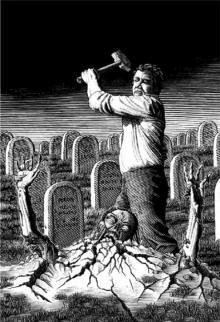 Dawn of the Dreadfuls
Dawn of the Dreadfuls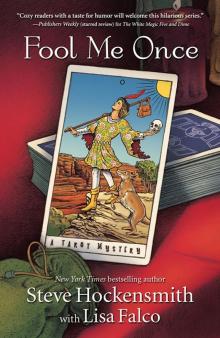 Fool Me Once: A Tarot Mystery
Fool Me Once: A Tarot Mystery The Hungry
The Hungry Naughty: Nine Tales of Christmas Crime
Naughty: Nine Tales of Christmas Crime Pride and Prejudice and Zombies: Dawn of the Dreadfuls papaz-1
Pride and Prejudice and Zombies: Dawn of the Dreadfuls papaz-1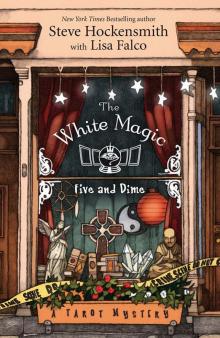 The White Magic Five & Dime (A Tarot Mystery)
The White Magic Five & Dime (A Tarot Mystery)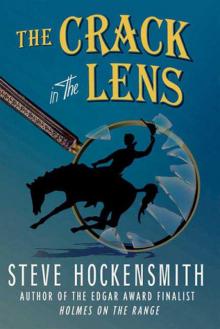 The Crack in the Lens
The Crack in the Lens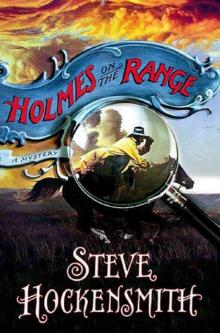 Holmes on the Range
Holmes on the Range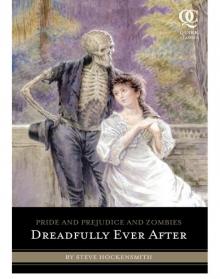 Dreadfully Ever After
Dreadfully Ever After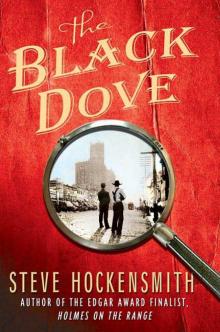 S Hockensmith - H03 - The Black Dove
S Hockensmith - H03 - The Black Dove On the Wrong Track
On the Wrong Track Naughty-Nine Tales of Christmas
Naughty-Nine Tales of Christmas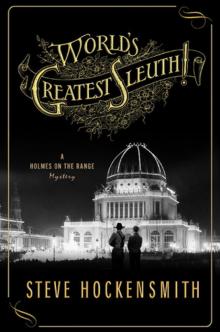 World's Greatest Sleuth!
World's Greatest Sleuth!